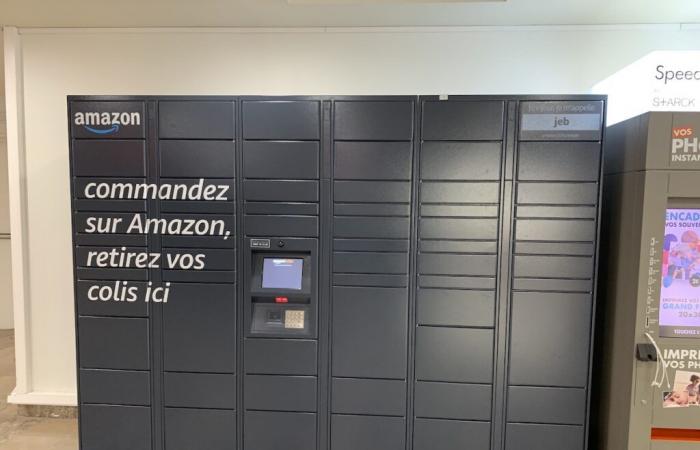At the beginning of November, a little more than a year after the entry into force of the Darcos law and its provision relating to the floor price of book shipping costs, Amazon responded with a proposal that was, to say the least, discussed. The online sales giant thus offers its customers free shipping costs for withdrawn books. in businesses selling books in particular ».
To do this, it relies on its automated lockers or on collection points installed within supermarkets and hypermarkets which themselves sell books.
The multinational ensures that it is in compliance with the legislation, which reserves an exception to the minimum price of shipping costs for purchases collected in “a book retail business “. Which allows booksellers, but also Fnac or Cultura to practice “click & collect» or «clicked-removed“… Since Amazon does not have a network of “brick and mortar” stores, large retail partners are being taken advantage of.
Good idea or workaround?
The online sales platform Amazon was, from the first discussions around the text, presented as the first opponent of this measure. In June 2023, the French subsidiary of the multinational filed an appeal for abuse of power against the ministerial decree which imposes minimum shipping costs of €3 for online book orders below €35, and of 0.01 € minimum for those above.
This appeal is still under examination, since the Council of State asked the Court of Justice of the European Union (CJEU) to clarify whether European law authorizes such a national measure, which regulates the exercise of services online, with the aim of protecting or promoting cultural diversity.
The European Commission itself had expressed serious reservations about the regulation of book shipping costs, questioning in particular the legality of this provision and its effectiveness in maintaining a dense network of bookstores as well as the diversity of the editorial offer.
Since its entry into force in October 2023, Amazon has multiplied its attacks on the legislation, through forums, studies commissioned from the IFOP and even this proposal to maintain free access. This last action is also reminiscent of the one cent of shipping costs applied by the giant, after the ban on free home delivery of books in 2014…
After Amazon’s announcement, the French Bookstore Union quickly reacted, denouncing a “circumvention of the law» by the multinational. “The question is therefore whether a locker located in a hypermarket corresponds to this definition. [de commerce de vente au détail de livres, NdR]. For our part, we doubt it, even if this hypermarket sells books», the organization told us.
A mission to enlighten
The whole question therefore lies in the compliance of the solution chosen by Amazon with the law on the single price of books, which now includes, since the Darcos law, the provisions relating to shipping costs applicable to works ordered online. The text presents this point as follows: “The book delivery service cannot under any circumstances, whether directly or indirectly, be offered by the retailer free of charge, unless the book is collected from a book retail store. »
It will therefore be necessary to decide, indicating whether Amazon’s interpretation is valid or not. During her hearing by the Committee on Culture, Education, Communication and Sport, in the Senate, this Tuesday, November 5 – the day of Amazon’s announcement – the Minister of Culture Rachida Dati assured that she would refer the matter to the Book Mediator.
This conciliation authority, created in 2014, handles disputes relating to the application of legislation relating to book prices, and the regulation of shipping costs therefore falls within its scope of action.
The mission letter, dated November 19, 2024, has just been sent to Jean-Philippe Mochon, the current Book Mediator. The Minister of Culture Rachida Dati recalls the context and Amazon’s proposal, emphasizing that “leading voices within the sector consider […] that such a practice is akin to circumvention of the law and that the withdrawal of a book ordered from an automated locker installed for example in the walls of a supermarket does not fall within the scope of the exception provided for by the law when“the book is collected from a book retail store”,even if this supermarket sells books. »
The document, which ActuaLitté was able to consult, lays out the Gordian knot that must be resolved: “The notion of withdrawal in a book retail business is subject to different interpretations.» Rachida Dati continues: “In view of these strong differences, I wonder what the conditions for withdrawal of book orders should be sufficient to meet the requirements provided for by law so that free access can be applied while respecting the major balances desired by the legislator. . »
READ – Delivery at €3: for Amazon, reading always pays the price
« I hope that you can contribute to a shared reading of the legislative system which fully respects its spirit.», Adds the minister. The Book Mediator will have to put the elements on the table, hear the different parties and try to obtain a consensus on the interpretation of the law. It will not impose a sanction, as it is not an administrative jurisdiction – which will not prevent a possible procedure of this type by one of the parties involved, if it considers itself wronged (the SLF has indicated that it does not rule out “possible legal action »).
The conclusions of the Mediator’s analysis and his recommendations are awaited by the Minister of Culture “by the end of next January“. This also leaves room for Amazon to apply its free shipping costs for books delivered to its collection points during the holidays, a crucial period for book sales and booksellers.
Photography: Amazon lockers at the Val de Fontenay shopping center, Fontenay-sous-Bois (Chabe01, CC BY-SA 4.0)
By Antoine Oury
Contact : [email protected]






